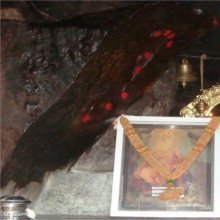Pambatti, Pāmbāṭṭi: 1 definition
Introduction:
Pambatti means something in Hinduism, Sanskrit. If you want to know the exact meaning, history, etymology or English translation of this term then check out the descriptions on this page. Add your comment or reference to a book if you want to contribute to this summary article.
Images (photo gallery)
In Hinduism
Shaivism (Shaiva philosophy)
Source: DSpace at Pondicherry: Siddha Cult in Tamilnadu (shaivism)Pāmbāṭṭi Siddhar.—One of the most famous among the later Tamil Siddhas is Siddha Pāmbāṭṭi. He is believed to have lived between 15th and 17th centuries. His songs are sung by the popular masses of Tamilnādu even today, because of his ‘cintu’ type of versification composed in folk-song meter and mostly in twilight language.
Pāmbu literally means a serpent and Pāmbāṭṭi means the snake-charmer who makes the snakes to dance. In the poems of the Siddha, the coiled power (kuṇḍaliniśakti) is often personified as a serpent. In all his 129 poems, the Siddha exhorts the serpent to dance, realizing the greatness of the Supreme Lord Śiva.

Shaiva (शैव, śaiva) or Shaivism (śaivism) represents a tradition of Hinduism worshiping Shiva as the supreme being. Closely related to Shaktism, Shaiva literature includes a range of scriptures, including Tantras, while the root of this tradition may be traced back to the ancient Vedas.
See also (Relevant definitions)
Starts with: Pampatti, Pampatticcittar.
Ends with: Pampatti.
Full-text: Pataran, Cakkirati, Pampatticcittar, Joki, Marudhamalai, Kundalini, Taniparai, Siddhar, Patin-encittar, Velliangiri, Kutumi, Atti.
Relevant text
No search results for Pambatti, Pāmbāṭṭi; (plurals include: Pambattis, Pāmbāṭṭis) in any book or story.
